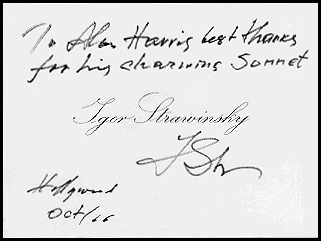

by Alan Harris
The following poems, except for the Stravinsky sonnet,
were previously published in The Triangle, literary magazine
of Illinois State University, in 1964, 1965, and 1966.
|
Free PDF download of this entire book: College Poems in Adobe Acrobat PDF format (14 formatted pages including color photos) Free Adobe Acrobat Reader is required. |
Contents
(Click on any divider between poems to return here.)|
At the Abattoir
Bidentity Free The Monument The Prophet Song of the Sick Minstrel A Sonnet to Igor Stravinsky A Traveler's Tale Twenty-One Lines of Tree |
The Monument
|
Our elm began to die that spring, slowly. Wanting stability in threat of change we ourselves searched all summer for a superlative glue, found it in our store of hardest ware, bought it dearly. That fall our elm did die, slowly. But we on variangled ladders refastened the fallen leaves with peerlessly permanent glue, then stood back and looked. Still it stands: crisp, dead; cutting the winter wind. |
PDF for printing
Bidentity
|
Beware, They warned; Scoff, We scorned. A pernicious disparity of essences shall be thy blight, said They; Love merges divisions to conquer all, We Two replied. Time wore on and us. Time found our seaming, Rotted away the silly thread, Laid bare two essences, unjoined. We cried, Woe: We lie in the palpitating entrails of Circumstance, never to be ejected: Woe. Then stopped. Reasoned: Who despairs at one disparity Must perish in a human crowd. Traded a sob for a synthetic: Be, difference; Viva. For now we are a pair. |
PDF for printing
The Prophet
|
Our city's wild-haired prophet Stumbled through the gutter Of our subtle street Crying: God is being killed, Murdered by a stoneman's hand-ax. Giddy chaos overwhelms his brain; Head-blood gushes down his face, Gurgles in his throat. He tears his chest With dying fingernails. I see him falling to the nadir of neurotic nothingness. God is dead; Mourn, man. Our prophet staggered on With timely steps until His voice was out of range Again. |
PDF for printing
Song of the Sick Minstrel
|
The winter night droops down Around the scratchy trees, Tinkled by an icy breeze, Snapping. Let's stand beside this creaking tree And watch the bold eclipse Devour the midnight sun As if it were a yellow wafer, Crisp and cold. At full eclipse, Then shall I love you, In snapping cold, Beneath a moon-dark tree. |
PDF for printing
A Traveler's Tale
|
Step over here a moment, if you please; I'll tell you a tale which may your fancy seize Or, if you're old, may possibly displease. Slipping time, of course, will kill a man, But, think I, there is something more than time In every natural death. Oh yes, say I, Vibrations of the supernatural Confound our lonely loony lives the more For our denial of their awesome power. Let me pluck a rich example from The undercurrents of my memory: The beard of wizened white swayed calmly as The brittle ancient rocked his pensive chair And reveried his many pasts. He knew Somewhere within his lonesome bones the ten Dead-looking fingers he possessed by far Outnumbered his remaining years or months Or--what he thought was likeliest--days. The optimist, yes, optimist I say, (Ten minutes would have been a closer guess) Could not foresee his tragedy that day. Each time he rocked he minused his remaining Seconds by one tick, one tock, one rock. The red clay jar stood center on the broken Top of marble on his yearful desk. The center of his life, this jar became, For parent after parent of his line Of ancestors had forwarded the myth That supernatural forces lurked within Its clay, some power that governed life and death. Religiously, throughout his wifeless life, The old man trimmed his fingernails just so, Not too long or crookedly or short, And dropped the trimmings carefully into The timeless jar with utmost caution not To let one fall outside its gaping rim. Oh, deepest death if ever that should happen-- Time would shuffle to a sickly halt. But now yeared eyes could plainly see that death Was far from far away: a mound of yellowed Fingernails was piled above the rim. The jar with all his packing down would hold Not many more, he knew. The time when one Would vibrate from the pile and fall beside The jar was near, too near to free his thoughts From dreams of death and musings of its shape. In silence as he rocked in silent thought His black-haired cat traversed the soiled rug And stopped unseen beside the desk. It gave A weakened leap (it lived on non-existent Rats and mice that roamed the undug basement Of the one-floor house) and missed its mark, Falling on its once-lithe feline ribs With an animal thud. The old man stopped His motioned chair and sat transfixed, wide-eyed. The cat resumed its feet and jumped its all And landed on the olden oaken desk. Its thready whiskers brushed across the jar: A fingernail end fell to the broken Marble surface of the desk, and then The cat fell lifeless to the rugged floor. A wave of horror washed the old man's brain-- He felt a thrill of long-lost warmth surround His head and stomach, bones and gasping lungs, And down into the deepness of the rug He fell, beside the rocking rocking chair. As nothingness approached he thought he heard His doorbell ringing for the first time since The ancient inundation and the garden With the stones and fiery wheels had come. The aged one was thus undone, kind friend. If this has entertained you, please be kind Enough to drop into this hat a coin. |
PDF for printing
Twenty-One Lines of Tree
|
A fecund soil-seed makes explosive blossom In the dankness of the womby underearth, Assimilates the healthness rain and chemistrates it Steadily into an ever-growing stem and Pop, one day, Pop. The embryo gives itself rude birth in dirt. A green grapple begins: Growth against the grave inexorable final-falling force. The yearly climb proceeds. Atom mounts photosynthetic atom, clings and lives. Cold unfeeling freeze-trees breezes wind Around a thickened frozen trunk, And warm moist licking balms blow teasingly Into unfurling sun-retaining leaves. Its life of cycling seasons lingers on Until arrives the fatal year: The tree dies--that is all, just dies and falls. The rotting wood and roots return their loan And merge into the ground again until A second soil-seed makes explosive blossom. |
PDF for printing
At the Abattoir
|
Splat. Grunt. Plop. We feed the world, Except for bloodless vegetarians. Come hither, sweet swine, And we will make you useful, Oh, so useful to mankind: Thud. Rip. Crack. Slit. Cow, your life-long destiny is consummated here. Your epitaph reads "Grade A, choice;" Your burial ground, the maw of man, Is decorated with two rows Of tombstone teeth. Remember, as you face the club, Your life perhaps has been in vain, But not your death. You die to serve a greater cause than you: The betterment of man, who talks and reads. Chop. |
PDF for printing
Free
|
Blurry smog feeds the morning sky gassy gulps as Germy motorcars scuttle in lines along their causal highways. Herewearefolksinourtrafficopterhelicopterreportingthe- latestdevelopmentsinthetrafficconditionAllstreets- arerunningsmoothlyasofrightnowanditlooksasthough- thisconditiionwillcontinuefortheremainderof-- The helicopter suddenly Descends into the mass Of smog and tin and milling men And violently cracks open like a transparent egg, Giving birth to an afterlife or two. Free. Free are helicopters. Free to fly about in untold yards of morning sky. Free to watch the roads of other men, advise them where to turn. Free, some, to fall a fast free path to the hardness of the ground. |
PDF for printing
A Sonnet to Igor Stravinsky
(Written in 1966)
Stravinsky's measured steps--halting by A cross an autumn-browning field of sound-- accent his humming of tomorrow's hymn on yesterday's three-octave voice of string. He ran away from sentimental ground to wA r against its farmers on a dim internal B attleground, and thence each spring has F ound him planting in new five-row fields. When blackbirds mimic from the field's ri m parading red and yellow on each wing (F or innovation raises greener yields), he styles himself Beelzebub in brown. Acros s the breeze Stravinsky halts by--his gro und will soak the blood of birds that diE. |
PDF for printing

|
Aphorism Collection: Daresayings (1999) |
Poetry Home Page |
Next Poetry Collection: Poems That Search and Poems That Question (1982) |